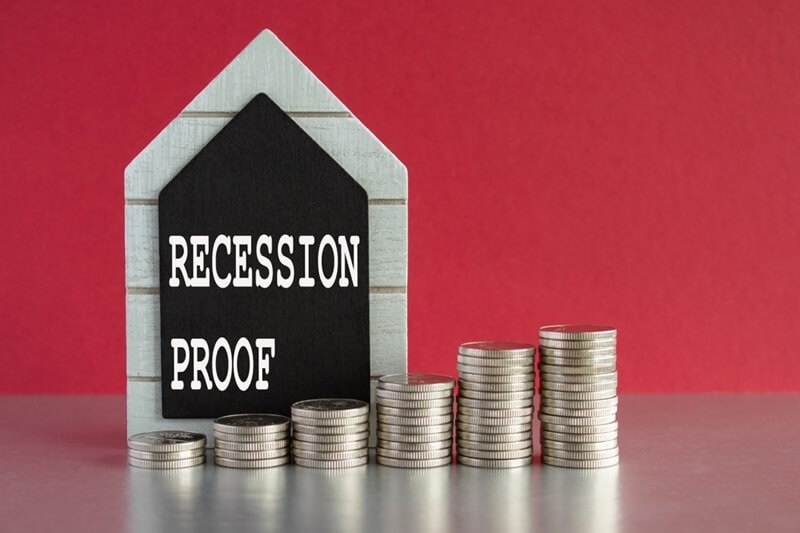
Let’s be real, when the word “recession” pops up, most people tense up. It’s that quiet fear of “what if?” What if the paycheck stops? What if prices rise again? You can almost feel the air change when inflation hits and your coffee suddenly costs a dollar more. But here’s the thing: financial anxiety doesn’t have to run your life.
Building recession proof finances isn’t about being immune to the economy. It’s about building habits that help you stay grounded no matter what’s happening outside your bank app. It’s less about wealth, more about balance, the kind that lets you breathe even when headlines scream “market crash.”
When people talk about being financially secure, they often imagine big savings or flashy investments. But recession proof finances are built differently. They’re about flexibility, having a setup that bends but doesn’t break when life takes a turn.
Think of it like building a sturdy house: your income is the foundation, your savings are the walls, and your investments are the roof. If one part shakes, the rest still holds. It’s not about predicting every downturn but being ready when it happens.
Here’s what most people get wrong, they think “recession proof” means no losses or no stress. That’s impossible. What it really means is that you’ve built a safety net so strong that even if your paycheck takes a hit, you won’t lose your peace of mind. That’s the quiet confidence smart financial planning gives you.
Also explore: Debt Management Strategies to Crush Loans & Credit Cards

You know what’s tricky? Inflation. It creeps up silently, eating away at your savings like a slow leak. One day, your grocery bill looks different, and you realize your money isn’t stretching as far. That’s where inflation savings come in.
Keeping your entire savings in a basic bank account might feel safe, but it’s not doing much for you. When prices rise and your cash earns minimal interest, you’re actually losing value. So, how do you make your inflation savings smarter?
Here’s the simple version: move your idle money into vehicles that keep up with or beat inflation. Think high-yield savings accounts, short-term Treasury bonds, or even Series I savings bonds. They’re not flashy, but they’re stable, and stability matters.
Let me explain it this way. Imagine your money as a runner in a marathon. Inflation is the competitor right beside it. If your money jogs too slowly, it falls behind. But with better inflation savings strategies, it keeps pace and finishes strong.
Sure, rates shift and markets fluctuate, but small adjustments make a big difference. The goal isn’t to chase risky returns, but to make your cash work quietly in the background while you focus on life.
If there’s one thing financial experts always agree on, it’s this, an emergency fund isn’t optional. It’s your personal safety net. Without one, even a small crisis can turn into chaos.
So, how much is “enough”? Most experts suggest three to six months’ worth of expenses. But here’s the catch, it’s not just about saving the money, it’s about emergency fund planning smartly.
That means parking your fund where you can access it easily, but not so easily that you’re tempted to dip into it for random stuff. A high-yield savings account or a separate money market account works perfectly.
And you know what’s funny? People often think they’ll “start saving when things settle.” Truth is, things rarely settle. You just start small, even $20 a week builds momentum. Over time, that little cushion turns into confidence.
Emergency fund planning is like keeping a first aid kit. You hope you’ll never need it, but when you do, you’re grateful it’s there. It keeps you from making panicked choices, like taking a high-interest loan or maxing out a credit card, when life throws a surprise your way.
Discover More: Investment Options Beginners in the U.S.: Stocks and More
You’ve probably heard this before, “don’t put all your eggs in one basket.” It’s cliché, but it’s also the backbone of smart investing. Investment diversification is what keeps your finances balanced when the markets get moody.
Here’s the thing, not every asset reacts to economic changes the same way. Stocks might tumble, but bonds could hold steady. Real estate might dip, but your side income from freelancing or dividends might keep you afloat. That’s why investment diversification isn’t just a fancy term, it’s survival strategy.
Let’s make it relatable. Imagine your financial portfolio as a playlist. You wouldn’t fill it with one genre, right? You’d mix upbeat songs, mellow ones, and maybe a few classics. That way, even if one song feels off, the vibe stays balanced. That’s what investment diversification does for your money.
You don’t need to be a Wall Street expert to build it either. Index funds, ETFs, and long-term assets can help you spread risk without constant monitoring. And if you’re new to investing, start simple, just make sure you’re not betting everything on one sector or one company.
Let's discuss the aspect that nobody highlights — habits. Even if you have the best plans, they will not yield any results without discipline. Building a financial structure that can resist recession calls for a changing of daily thoughts on spending and saving.
Adopt a value-based budgeting system, which is the first step. The principle of value-based budgeting allows you to spend mindfully rather than unwisely. If dining out is one of your pleasures, then keep it as is, but reduce it where it does not matter as much. YNAB or Mint, for instance, are apps that easily help you to track your expenses without feeling guilty.
Furthermore, on the other hand, there is the earning potential. A modest side job or freelance work might act as a cushion for you in difficult times. Though working on platforms like Upwork or Fiverr may not lead to becoming a millionaire, they can be of help in settling bills when the economy is not in good shape and the cash flow is low.
Being resourceful is also a point — learning the necessary basic DIY repairs, preparing food from scratch, or going through the list of all the subscriptions you have and eliminating the ones that are not used. Such little changes aren’t repulsive; rather, they enable one to gain mastery over the situation.
Don’t Miss: Retirement Planning Basics Guide for Young Adults in the USA
There’s no magic formula to financial stability. You’ll have good months and tough ones. But the more you practice saving smartly, planning your emergency fund, and diversifying your investments, the stronger your recession proof finances become.
It’s not about perfection; it’s about preparation.
The world won’t stop changing, but your sense of control can grow steadier every day. So, start where you are — review your inflation savings, adjust your investment diversification, revisit your emergency fund planning — and just keep building.
Because financial freedom doesn’t happen in a rush. It happens when you quietly make smart moves, even when no one’s watching.
This content was created by AI